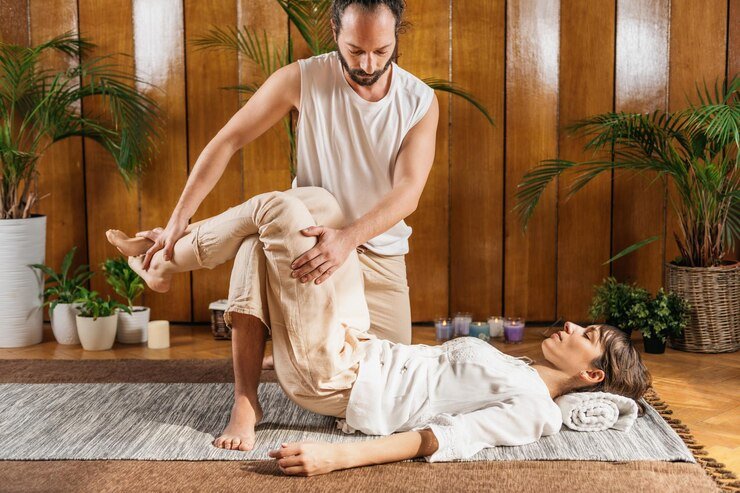Health & Fitness
Which Work Experience Is Helpful in the Medical Field?

As a student, obtaining work experience can be difficult. Not sure where to begin? This post will offer some ideas for substitute job experiences and explain how to include them in your application to medical school.
Why do work experience in the medical field?
Admissions tutors are looking for evidence that you understand the reality of a medical career and the healthcare industry when you apply to medical school. Getting a job also demonstrates your drive to study medicine since it demonstrates your interest and diligence in the subject.
Which kind of jobs are relevant to medicine?
Experience can be obtained in a variety of methods, but it’s crucial to remember that it’s not the most crucial component of your application. Instead, admissions tutors are significantly more interested in the abilities you have acquired, the realizations you have made, and the reflections you have had after that encounter. This implies that obtaining hospital or general practitioner placements is not a requirement for being considered for a successful application, particularly in light of the recent COVID-19 pandemic that has made gaining work experience for medicine extremely challenging. If your reflections are strong, virtual experiences can be valued just as highly as in-person ones. In a similar vein, non-medical employment experience, such as retail or tuition center work, elementary school or assisted living volunteer work, can also be immensely beneficial.
What options are there for non-medical work experience?
The following are some ideas for non-medical work experience that you could pursue to hone your talents and obtain insight into healthcare professionals:
Volunteer activity, such as in a sports club, care facility, hospice, elementary school, charity store, or sports club. Volunteering demonstrates your dedication to and empathy for the less fortunate.
Supporting COVID-19 – you might have volunteered to perform a necessary service or assisted in delivering supplies to someone who was isolated. As an alternative, you might have volunteered at neighborhood testing facilities or joined a group that offers calling services to the abandoned and vulnerable. If you’re still seeking for inspiration, you may apply to work as a steward at lateral flow locations or your neighborhood immunization clinic. Do some research to find out what prospects might be in your area, but most importantly, keep cautious!
In addition to helping you gain transferrable skills and insight into a professional setting, working a part-time job can supplement your academic pursuits. This could involve completing paper rounds, working in retail, or even tutoring part-time.
How can you maximize your experience in non-medical work?
There is a common misperception among students that their non-medical professional experience may not be as beneficial. Experience in the workplace that allows you to grow professionally and as a person is beneficial for both your personal development and your medical school application. For instance, working in retail may help you develop your resilience and confidence, two qualities that are crucial for doctors to have while dealing with difficult cases and lengthy workdays. As a sports coach, you might have honed your communication abilities, which is important for doctors who must always communicate with patients, family, and coworkers. When drafting your personal statement and preparing for interviews, consider the skills you have gained from your non-medical work experience and how you can apply them to a medical setting to make the most of it. Watch for our post on “What to write in a personal statement for medicine” for an extensive list of abilities and how to make connections from them.
Which virtual options exist for medical job experience?
- Conversing with and conducting interviews with medical professionals. This demonstrates your drive to learn more deeply. This can involve posing inquiries via phone, email, or in person.
- Keep an eye on GP. This is a free interactive video platform available to UK students who are older than sixteen. Visit the website https://www.rcgp.org.uk/training-exams/discover-general-practice/observe-gp.aspx to learn more.
- Volunteering with groups like Age UK. You can assist with a variety of services, such as volunteering as a neighbor or signing up as a digital buddy. Visit the following page to learn more about volunteering with Age UK: https://www.ageuk.org.uk/get-involved/volunteer/. As an alternative, you can look for more local volunteer opportunities by visiting the website of your local municipality.
- Virtual work experience course for BSMS. Students can learn about the NHS and its six specializations through this online course. Go to https://bsmsoutreach.thinkific.com/courses/VWE to learn more.
- Podcasts and videos. These are excellent resources for people who want to learn more about what physicians and other healthcare workers do on a daily basis. Having access to these resources from home is a practical approach to investigate the role of doctors in a safe manner, especially in light of COVID-19 lockdowns and limits. To keep track of your observations and the lessons you have learned, we strongly advise you to write down your feelings and reflections after each experience. In order to demonstrate your enthusiasm and interest in interviews and your personal statement, it would therefore be a good idea to look into and make a note of some of the themes that piqued your interest. For suggestions on TV shows and podcasts that could interest you, visit our blog’s reviews area (link). You may watch a huge selection of programming on BBC iPlayer, or if you’d prefer something a little bit shorter, check out some of the medical TED talks.
Asking about previous employment
It can be intimidating to send emails requesting work experience in the medical field. To assist you, we have created a thorough, step-by-step instruction. Being proactive, courteous, and persistent is crucial. Do not lose hope if you don’t hear back right away. Continue attempting and send emails to several different companies.
We strongly advise checking out our blog post on how to ask about medical work experience in a professional email!
Recording the work experience you’ve had
Documenting your experiences can be a good idea because it will enable you to select particular instances to use while creating your personal statement and getting ready for interviews. See our Work Experience Reflection Guide for an in-depth explanation on how to accomplish this.
Health & Fitness
Injured in Des Moines Check this ultimate guide for seeking legal help

Hundreds of accidents are reported in Des Moines every year. From car and motorcycle accidents to dog bites and slip & fall mishaps, people often suffer consequences in incidents because of someone else. Iowa personal injury lawyers allow you to recover a settlement by filing a claim, but navigating the legal maze is no easy task. You need to find an attorney who can fight for you to get the maximum settlement. You can consider meeting the attorneys of The Baer Law Office for a FREE case evaluation. For your help, here is a guide that will help you tide through the process.
Start your search
How do you find reliable injury lawyers in the city? Your best bet is to talk to friends and family members or anyone who has worked with an attorney or has filed a claim. Recommendations can give you a head start. If that’s not an option, there are ready online directories that can help. You can also find third-party websites where there are lists of attorneys practicing in Des Moines.
Make a questionnaire
Most law firms in Des Moines won’t demand a fee when you go for the first meeting. You should use the time efficiently to interview the potential attorneys. As a client, make a questionnaire, which should involve probing the lawyer’s work. Ask questions like – How many years have you been practicing personal injury law in Iowa? What are some of your highest settlements and landmark wins? What can you tell me about your experience of working on similar cases? There is no harm in discussing these details.
Be ready for the tough facts
Numerous variables can affect your compensation. For instance, if you want to file a dog bite-related claim against your neighbor, but they say you were trying to trespass, the outcome could be drastically different. Ask the attorney about the factors that need attention. Your lawyer should not sugarcoat details and set realistic expectations.
Look for the positive traits
What are the things that differentiate a competent lawyer from an average one? The first one is the response. If an attorney doesn’t make you wait for days to get a meeting, you know they are willing to help. The next thing is communication. A credible lawyer takes time to listen to the client’s story, educate them on the Iowa laws, and explain how things are likely to move. Finally, you expect an attorney to be available when necessary.
Ask about strategy
If an injury lawyer has handled numerous cases in Des Moines, they probably have an idea of how to approach your claim. Ask the attorney what they plan to do next, if they need to hire expert witnesses or other professionals, and whether the case is likely to go to court.
Enquire about the fees and expenses
Personal injury lawyers are interested in what you recover, and instead of the standard hourly rate, they work on contingency. That essentially means that the attorney doesn’t demand an upfront fee but gets a fixed share of your settlement. Multiple things can decide the contingency percentage, but on average, it doesn’t exceed 50%. It would help if you also asked the attorney whether you have to pay for anything. If you don’t have the financial wherewithal to cover the extra expenses, they can help you.
Summing up
Finally, take your attorney’s advice seriously. If an injury lawyer decides to work on your case, they may ask you to follow a few dos and don’ts, which you must adhere to. Your lawyer will handle everything else, including negotiations, paperwork, and deadlines. Hire an attorney immediately after you are hurt.
Health & Fitness
The Transformative Power of Massage Therapy: A Gateway to Holistic Health

In a world where stress and physical ailments are increasingly prevalent, massage therapy stands out as a timeless remedy offering profound relief and rejuvenation. This ancient practice, rich in history and diverse techniques, provides a holistic approach to enhancing both physical and mental well-being. This article explores the comprehensive benefits of 스웨디시 therapy and its crucial role in modern wellness.
The Ancient Origins of Massage Therapy
Massage therapy has a rich history dating back thousands of years, with its origins in ancient civilizations like China, Egypt, India, and Greece. In ancient China, massage was an integral part of traditional medicine, practiced as early as 2700 BCE. Similarly, Ayurvedic medicine in India emphasized the therapeutic benefits of massage for balancing the body’s energies. These time-honored practices have evolved, influencing contemporary massage techniques that cater to a variety of health needs.
Exploring Different Types of Massage Therapy
Massage therapy encompasses a wide range of techniques, each tailored to address specific health issues and preferences. Some of the most popular types include:
- Swedish Massage: Known for its gentle, flowing strokes, Swedish massage is ideal for relaxation and improving blood circulation.
- Deep Tissue Massage: This technique targets the deeper layers of muscle and connective tissue, providing relief from chronic pain and muscle tension.
- Sports Massage: Designed for athletes, sports massage enhances performance, prevents injuries, and speeds up recovery.
- Thai Massage: Combining acupressure, stretching, and compression, Thai massage promotes flexibility and energy flow.
- Hot Stone Massage: Using heated stones, this technique enhances muscle relaxation and blood flow, offering a deeply soothing experience.
The Holistic Benefits of Massage Therapy
Massage therapy offers a myriad of benefits that contribute to overall health and well-being. Here are some key advantages:
- Stress Reduction: Regular massage sessions help lower cortisol levels and increase the production of serotonin and dopamine, leading to reduced stress and enhanced mood.
- Pain Management: Techniques like deep tissue and trigger point massage are particularly effective in alleviating chronic pain conditions such as back pain, arthritis, and migraines.
- Improved Circulation: Massage stimulates blood flow, which helps deliver oxygen and nutrients to muscles and tissues, promoting faster recovery and healing.
- Enhanced Flexibility and Mobility: Regular massage improves joint flexibility and muscle elasticity, reducing the risk of injuries and enhancing physical performance.
- Boosted Immune System: Studies suggest that massage can enhance immune function by increasing lymphatic circulation and reducing stress hormones.
Integrating Massage Therapy into Your Wellness Routine
Incorporating massage therapy into your regular health regimen can significantly improve your quality of life. Here are some tips to maximize the benefits:
- Consistency: Regular massage sessions, whether weekly, bi-weekly, or monthly, can provide cumulative benefits and enhance overall well-being.
- Clear Communication: Discuss your health goals and any specific areas of concern with your massage therapist to ensure a personalized and effective treatment plan.
- Hydration: Drinking plenty of water before and after your massage helps flush out toxins and keeps your body hydrated.
- Complementary Practices: Combine massage therapy with other wellness activities such as yoga, meditation, and a balanced diet for optimal health benefits.
Conclusion
Massage therapy is a timeless practice that offers a holistic approach to health and wellness. Its extensive benefits, rooted in ancient traditions, are highly relevant in today’s fast-paced world. Whether seeking relief from chronic pain, reducing stress, or simply indulging in self-care, 스웨디시 therapy provides a comprehensive solution for enhancing overall well-being. Embrace the transformative power of massage therapy and make it a regular part of your journey to a healthier, more
Health & Fitness
Navigating Careers in Healthcare: Opportunities and Challenges

Key Takeaways
• Healthcare careers offer diverse opportunities but come with their own set of challenges.
• Understanding the evolving landscape of healthcare can help job seekers make informed decisions.
• Networking and staying updated with industry trends are essential for career growth.
Healthcare providers offer diverse opportunities, from direct patient care roles like doctors and nurses to administrative and support positions. The field is known for its job stability, competitive salaries, and the personal fulfillment from helping others. However, healthcare professionals often face challenges such as long hours, high-stress environments, and the need for continuous education to keep up with medical advancements. Navigating a healthcare career requires dedication, resilience, and a commitment to lifelong learning. Networking, mentorship, and professional development are essential for career progression. Despite the challenges, a healthcare career can be gratifying, offering personal and professional growth.
The Diverse Landscape of Healthcare Careers
Healthcare is a vast field with many career options ranging from clinical roles like doctors and nurses to administrative positions and healthcare IT. Each function offers professional and personal growth opportunities and has varying skill requirements. For instance, those interested in travel nurse jobs in California have numerous opportunities, given the current demand for healthcare professionals in that region. The market is underpinned by the dynamic nature of healthcare needs and the substantial population in states like California. The need for healthcare professionals is expected to grow steadily over the next ten years, according to the Bureau of Labor Statistics projections, offering a wide range of career opportunities. This growth is driven by factors such as an aging population, chronic disease prevalence, and advances in medical technology.
Essential Skills for Success in Healthcare
Succeeding in the healthcare sector requires a combination of hard and soft skills. The most important things are critical thinking, empathy, and effective communication. Healthcare professionals must navigate complex patient care scenarios effectively and often make critical decisions under pressure. Additionally, being adept in technological tools is becoming increasingly important, given the trend towards digitalization in healthcare. For example, understanding electronic health records (EHRs) and telehealth platforms can give job seekers a competitive edge. Healthcare practitioners must be lifelong learners who constantly update their knowledge and abilities to provide the best care possible due to the constant improvements in healthcare technology.
Challenges Faced by Healthcare Professionals
Despite the rewarding nature of healthcare careers, professionals often face significant challenges. Long hours and high-stress environments are commonplace, particularly in emergency and intensive care settings. The emotional toll of patient outcomes and the job’s physical demands require robust coping strategies and support systems. Furthermore, healthcare professionals need continuous education and training to keep up with the rapidly evolving medical fields. The constant need for upskilling can add to the workload but is essential for maintaining high standards of patient care. Establishing a work-life balance and seeking mental health support when needed can significantly contribute to long-term career satisfaction. Leveraging resources such as peer support groups and professional counseling can provide much-needed relief and resilience.
Staying Updated with Industry Trends
In an area that is changing quickly, like healthcare, it is imperative to stay current on current trends. Changes in regulations, advancements in medical technology, and emerging health threats all necessitate that healthcare professionals remain proactive learners. Engaging in relevant journals, attending workshops, and connecting with other professionals can offer valuable insights. HealthIT.gov and similar websites provide extensive information on the most recent advancements in healthcare technology. Engaging with these resources can help professionals stay informed about innovations that can improve patient outcomes and streamline healthcare delivery. Staying informed promotes professional development and enhances the standard of patient care.
Networking in the Healthcare Sector
Making progress in the healthcare sector requires building a solid professional network. Networking fosters relationships, leading to career opportunities, collaborations, and mentorship. Attending industry conferences, joining professional associations, and engaging on platforms like LinkedIn can open doors to new possibilities and collaborations. A robust network can also offer support and mentorship, which are invaluable in navigating the complexities of a healthcare career. Seasoned professionals can provide guidance, help navigate career transitions, and offer insights into best practices within the industry. Furthermore, networking can lead to collaborative opportunities in research and clinical practice, advancing both individual careers and the field of healthcare as a whole.
Opportunities in Various Geographic Locations
The geographical location can significantly impact career opportunities in healthcare. Urban areas often offer more job openings and specialized positions due to larger populations and more extensive healthcare facilities. Conversely, rural areas may provide opportunities for broader roles with a more significant community impact. Job seekers should consider these factors when exploring options. In rural settings, healthcare professionals can take on diverse responsibilities, gain a wide range of experience, and establish closer connections with the community. At the same time, urban settings offer more opportunities for specialization and advancement in cutting-edge medical fields.
Conclusion
The healthcare industry presents a dynamic and rewarding career path for individuals with the right skills and knowledge. Success in this field requires understanding its diverse opportunities and challenges, such as patient care, administration, and technological advancements. Staying updated with industry trends is crucial, as the healthcare landscape constantly evolves with new treatments, regulations, and innovations. Professionals can navigate their careers effectively by leveraging networking, which provides support, mentorship, and job opportunities. Continual learning is essential to keep up with medical advancements and enhance skills. Resilience is necessary to manage high-stress environments and long hours. Building a supportive professional network is equally essential for career progression and support. With these strategies, individuals can contribute significantly to healthcare, achieving both personal and professional fulfillment while ensuring long-term success in their careers.
-

 Technology8 months ago
Technology8 months agoExploring Entretech.org: Unveiling the Future
-

 Life Style8 months ago
Life Style8 months agoExploring Myfavouriteplaces.org:// blog: A Journey Begins
-

 Technology8 months ago
Technology8 months agoGPT66X: Revolutionizing Language Models
-

 Eentertainment9 months ago
Eentertainment9 months agoThe Flower of Veneration Chapter 1: A Journey into Intriguing Realms
-

 Games8 months ago
Games8 months agoFour Digits to Memorize: Unlocking the Power of Memory
-

 Technology9 months ago
Technology9 months agoAmazons GPT55X: Revolutionizing Natural Language Processing
-

 Technology8 months ago
Technology8 months agoUnlocking the Potential of TrendzGuruji.me for Awareness
-

 Technology9 months ago
Technology9 months agoUnderstanding “qxefv” and Its Impact on Diverse Industries




















